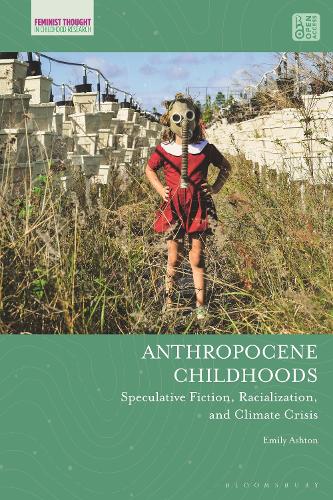
Anthropocene Childhoods: Speculative Fiction, Racialization, and Climate Crisis
(Paperback)
Available Formats
Publishing Details
Anthropocene Childhoods: Speculative Fiction, Racialization, and Climate Crisis
By (Author) Emily Ashton
Bloomsbury Publishing PLC
Bloomsbury Academic
30th May 2024
United Kingdom
Classifications
Tertiary Education
Non Fiction
809.89282
Physical Properties
Paperback
208
Width 156mm, Height 234mm
Description
This open access book brings together the disciplines of childhood studies, literary studies, and the environmental humanities to focus on the figure of the child as it appears in popular culture and theory. Drawing on theoretical works by Clare Colebrook, Elizabeth Povinelli, Kathryn Yusoff, Donna Haraway and Bruno Latour the book offers creative readings of sci-fi novels, short stories and films including Frankenstein, Handmaids Tale, The Girl with All the Gifts, Beasts of the Southern Wild, and The Broken Earth trilogy. Emily Ashton raises important questions about the theorization of child development, the ontology of children, racialization and parenting and care, and how those intersect with questions of colonialism, climate, and indigeneity. The book contributes to the growing scholarship within childhood studies that is reconceptualizing the child within the Anthropocene era and argues for child-climate futures that renounce white supremacy and support Black and Indigenous futurities. The eBook editions of this book are available open access under a CC BY-NC-ND 4.0 licence on bloomsburycollection.com. Open access was funded by Knowledge Unlatched.
Reviews
Ashton has produced a provocative and engaging text, which challenges the reader to interrogate our configurations of childhood through an exercise in apocalyptic thinking via the medium of speculative fiction. Through her subjects racialized child-figures at end of the world she challenges white, privileged versions of childhoods of the Anthropocene. A must-read for anyone who is engaged in deep reflection on the futures of childhood and childhood studies. * Anne Luke, Director, Inclusion, Childhood and Youth Research Centre, School of Education, University of Leeds, UK *
The figure of the child has long been mobilized as a symbol of hope for the future. But in these precarious times of anthropogenic climate change, humanitys future is no longer assured. In this provocative book, Emily Ashton challenges us to re-imagine the possibilities for child-climate futures by drawing on feminist, Black and Indigenous geologics to speculate about hopeful otherwise modes of being and relating on a damaged Earth. * Affrica Taylor, University of Canberra, Australia *
Author Bio
Emily Ashton is Assistant Professor of Early Childhood Education at the University of Regina, Canada.
